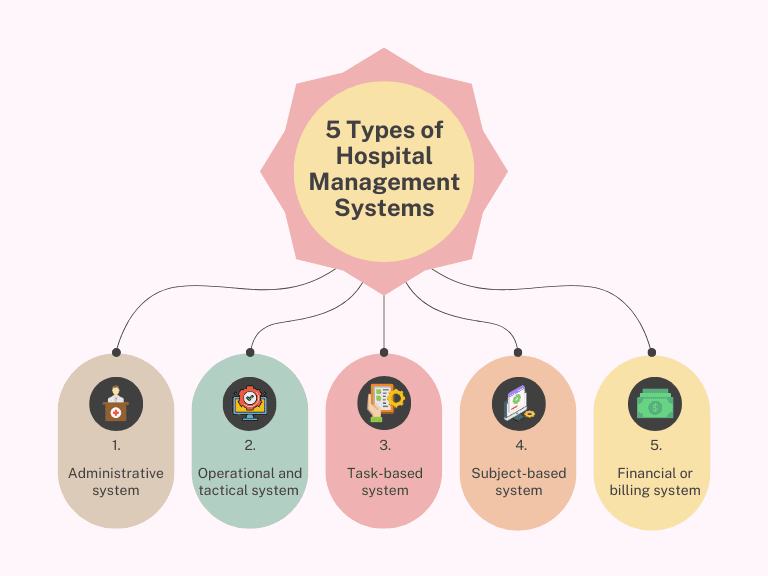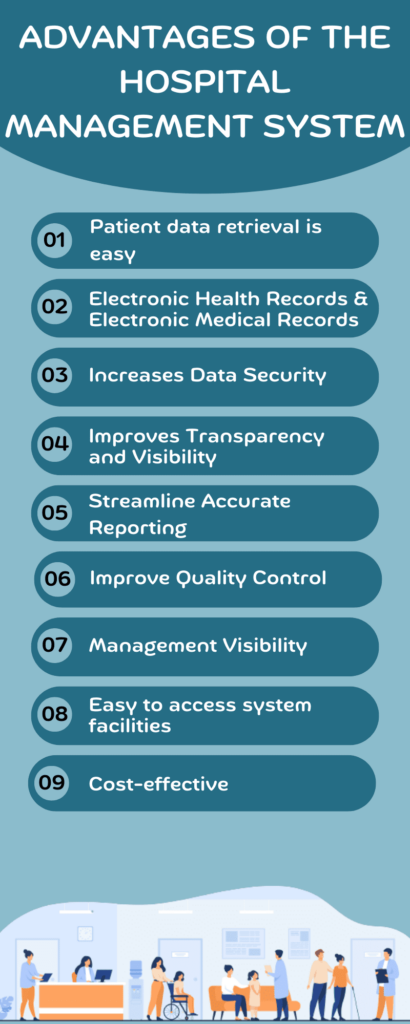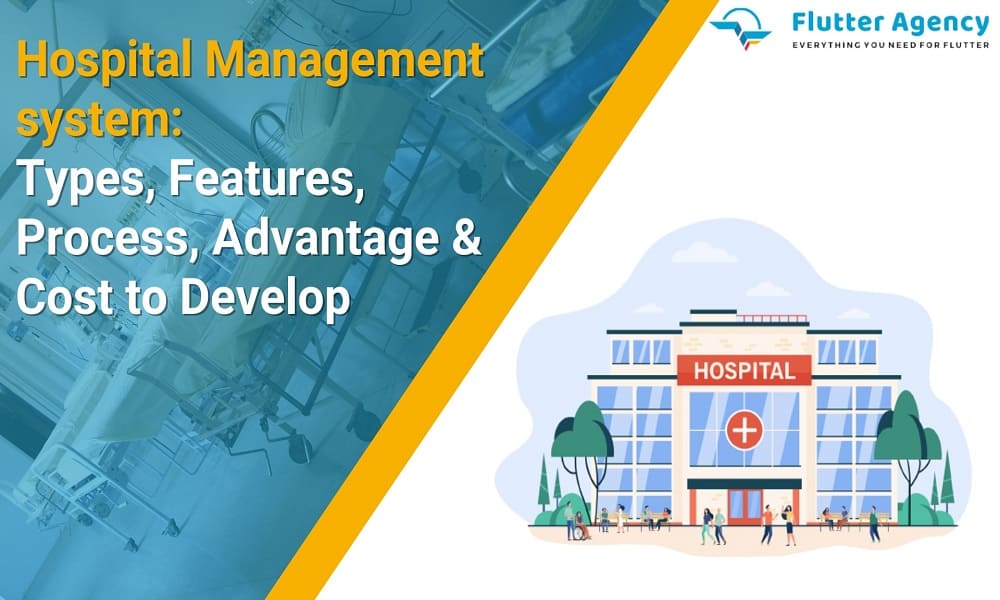Hospital Management System: Types, Features, Process, Advantage & Cost to Develop
As the healthcare industry is responsible for millions of lives, there is no doubt that it is the most significant economic sector. The health industry delivers care to billions of people worldwide. However, monitoring and caring for our health is vital for people’s well-being.
Although, the use of technology is becoming essential. However, owing to this impact and its contribution to healthcare, the hospital management system (HMS) has become the most important part of people’s lives. Hence, the HMS is an effective tool for gathering patient data, keeping vital records safe and secure, and many more.
This article will give you an overview of the hospital management system, benefits, features and costs.
Hospital Management System: Overview
Healthcare management software is utilized to manage all the workflow of the clinics, including medical, financial, legal, and administration. The digital record of the hospital’s activities allows professionals to keep track of activities systematically.
Healthcare experts will interact with the patients easily and effectively with Hospital management software. However, the hospital management system allows doctors and nurses to treat and diagnose patients more accurately.
Patients will get a glitch-free experience at the hospital, and proper working is ensured to achieve optimum results. Hence, it facilitates departmental collaboration with an intelligent hospital management system to get scalability and integrated patient care management.
Types of Hospital Management Systems
The Hospital Management system is divided into various categories depending on its functions. The leading kind of the hospital management system in the market are:

1. Administrative system
An HMS will collect, store and procedure all patient-doctor interaction data. The data is added to the electronic patient’s record for a treatment course, medical history, medications and many more details. However, by analyzing patient health records, the administrative HMS will also report on the efficiency of treatment methods.
2. The operational and tactical system
Hospitals and patients are negatively affected by mistakes in medical data. The primary objective of this system is to organize and classify medical information. However, the data from a healthcare firm is accessible and interoperable with this kind of system. The inconsistency of medical data is also being detected by it. Therefore, an operational HMS also gives multiple levels of data access that suit multiple user statuses despite the interoperability.
3. Task-based system
Medical organizations have several tasks to complete every day. Having the task-dependent HMS is a great solution for managing the tasks and helps supervise the employees. However, rather than manually assigning tasks to the experts, this stem aids clinics to assign them as suitable specialists automatically. The employees will receive a brief description of the tasks and their wireframes within a few hours of the task being built.
4. Subject-Based system
This system will convert the patient’s paper record into EMRs or EHRs. The issue with a paper record is that it might lose it and is very difficult to manage. Hence, subject-based systems are essential for Hospitals as they reduce any risks associated with proper documents and will manage the data. Therefore, virtually sharing, updating and deleting the data is possible with these systems.
5. Financial or billing system
Healthcare units must handle the billing and the other insurance operations. The sustainable financial performance of the healthcare organization is based on the implementation of the financial system. After a patient receives medical services, this system will send its treatment records to insurance companies to process payment. All financial information has been recorded, and a billing system stores it to retrieve it as early as possible.
Importance of HMS in hospital
HMS was developed to solve any complexities coming from managing all paperwork of each patient associated with multiple departments of hospitalization with confidentiality. It provides the ability to manage all paperwork in a single place and reduces the work of the staff in arranging and analyzing the patients’ paperwork. In other words, it can be said as a Time-saving technology that has improvised efficiency by eliminating human errors. Hence, it is a cost-effective and easily manageable solution for a healthcare organization.
Advantages of the Hospital Management System
You are responsible for choosing the best HMS per your organization’s purposes and requirements. Let’s see some of its benefits below and how it will be great for hospitals.

1. Patient data retrieval is easy
HMS is making it possible to access all data related to the patient via the system with just a few clicks. For example, information such as test reports taken, medication billing, current illness, doctor involvement, and many more can be visible to the user. These data will aid in connecting with the patient and their treatment, diagnosis and medication.
2. Electronic Health Records(EHR) or Electronic Medical Records(EMR)
This electronic-based medical system is viewed as the patient’s health chart. It retrieves the data dependent on the name of the patient or medical record number, or a physician’s record number.
Also, Read This Post:
EMR vs EHR: Which one to select for your Healthcare App Development?
3. Increases Data Security
The patient data is sensitive and must be kept with high security by using HMS in your hospital. It can be accessed by only authorized and limited personnel. Hence, all data is saved on the cloud or server and kept safe by a high-security password.
4. Improves Transparency and Visibility
Hospital Management System will improve visibility and transparency in the whole management procedure and all the records.
5. Streamline Accurate Reporting
It will support you in streamlining precise reporting with updated and correct records.
6. Improve Quality Control
The Hospital Management system will also improve the quality control of the services and products of the hospital.
7. Management Visibility
It will ensure the management visibility of the hospital, all data, and data related to patients; any department easily views medicine and doctor.
8. Easy-to-access system facilities
It will easily make it easy to access the management system facilities for authorized users. It will keep it safe from unauthorized users and minimize the chances of losing patient information.
9. Cost-effective
HMS will not only save time in the hospital but also prove to be cost-effective by decreasing the number of people working on systems of manual data entry and paperwork. Hence, integrating this system will decrease human intervention, thereby avoiding human errors. Nowadays, healthcare mobile application development becomes popular as it is a cost-effective way to manage your whole hospital system on mobile devices.
Features of Hospital Management System (HMS)
As this is a highly specialized industry, hospital management software needs custom features not usually found in other organization development. The HMS’s functionality is separated into management and patient-care tasks.
HMS Management features
- With HMS, caregivers can monitor and manage their availability, schedule appointments and make the timetables easily accessible for patients.
- Schedule and manage hospital surgical facilities and allocate more resources to staff to work efficiently.
- With this tool, caregivers will manage hospital departments, track the progress and plan for future management.
- HMS helps the medical staff monitor medication inventory.
- When patients are admitted to a hospital for treatment, their diet is frequently supervised and given by health professionals. This model allows cafeteria staff to order and prepare meals, particularly for each patient’s needs.
- With the help of inventory and purchase management, hospital supplies and medications are tracked using this functionality. For example, it will keep track of ambulance fuel consumption, electricity and water usage.
- Laundry management will help to keep the patient’s & doctor’s clothes laundry clean and bacteria-free at all times in order to prevent infections.
HMS Patient-Oriented Features
- The patient registration system will help the patients to register into the hospital with a few clicks.
- A patient’s Electronic Health Records are gathered and stored, and the data can be updated and retrieved as it is required after admission.
- The patient billing and insurance will manage the financial operations like billing and insurance.
- The emergency care module will simplify registering patients in the ER.
- Pharmacy data of Patients will aid them in refilling their prescriptions.
- Patients will get a notification about an appointment, medication timing, etc. Hence, it is handled by different apps and linked to the hospital management system.
Also, Read This Post:
Pharmacy App Development: Features, Process & Core Panels
HMS Help the System to Boost Quickly and Takes the Hospital Towards The Micro Level
HMS is the way that will help you to boost healthcare services with productivity. It helps them organize the data and strategy and gives them access to critical data, allowing them to work efficiently and effectively. Hence, it prevents the staff from performing menial tasks like scheduling, paperwork, and many more. It has facilitated the whole system because all the administrative functions usually fall on the hospital management department.
The comprehensive approach to hospital information management will allow for more on-ground coordination by keeping in mind the primary objective is to give efficient, quality healthcare to patients. It is utilized when modern technology will reduce notation errors, staff burden to find the files, an unauthorized person cannot access information about the patient, see about the patient history and treatment, and many more. Hence, a digital approach to hospital management permits managers to be more proactive with digitized information and management processes.
Users of an HMS
A healthcare app developer must recognize an audience using your system to plan and coordinate efforts, select the best technologies, and develop a perfect solution. Programmers must know that an HMS is a sophisticated software used to interconnect program modules, giving management capabilities to the huge number of humans interconnected with a hospital.
1. Hospital Administration
The people under this category may belong to finance, HR, Accountants, etc., and they have the grant to access basic information about the patient.
2. Doctors and Authorized Employees
Doctors and paramedical staff such as Surgeons, Nurses, Laboratory staff and OPD officers can access much critical and detailed patient information. It will not only make use of data for patient analysis but also recommend the treatment. Doctors and the various paramedical staff are the major audiences of HMS.
3. Patients
Patients will use the HMS to book appointments with doctors and check laboratory test results. The Hospital Management system will aid you in speeding up communication and will exchange data between a patient and hospital personnel.
Cost to create the Hospital Management system
Providing the accurate estimation of investments you require for the hospital management system, and the cost is dependent on the several key factors which contribute to an overall cost:
- Features and Functionality set
- Complexity of system
- Technology stacks like frameworks, libraries, tools, etc. used in the development phase
- The project software integration, such as third-party services, IoT, etc., is added
- Development team size of hospital management application
- Development team location and rates
However, while calculating the cost of creating the system, consider developer’s rates, which usually differ from country to country. Usually creating the MVP of hospital management software usually takes 4 to 6 months, but it depends on the experience and complexity.
If you want to know the brief estimation of your HMS project, then consult with our experts, who will give you an accurate estimation, and the time frame depends on your healthcare organization’s needs.
Wrapping Up
Developing the Hospital Management system is a great way to boost medical faculty productivity, decrease workload, streamline workflow and raise customer satisfaction rates.
A clinic management system has come in an amazing variety with various levels of complexity and features based on establishment peculiarities, requirements, and approaches to work. Also, a software management system is available in the market for sale that is ready for commercial use as they do not grant a similar level of customization specifically designed the software does.
Creating a custom hospital management system needs extensive development, business expertise, and knowledge of the healthcare industry. Flutter agency has the whole development cycle and has experience in developing software for the healthcare industry. We would be happy to develop a healthcare management system that elevates your medical facility’s productivity to an advanced level.
If we can help you, get in touch with us!
More Resource:
A Complete Guide On Healthcare Website & App Design
Emerging Technologies for Healthcare Industry in 2023
How to Improve Healthcare Reporting Management System
The Role Of Cloud Computing in the Healthcare Industry?
Frequently Asked Questions (FAQs)
1. What is the objective of the hospital management system?
The hospital management system will help to register complete patient data. It stores and captures the medical history, treatment, details of their previous visits, and more. It will help you eliminate any requirement we get on visiting the clinic.
2. How will hospitals maintain service quality?
Managing the service quality within the hospital needs an efficient approach to collecting feedback on the care given. Healthcare providers examine the perceptions of various stakeholders, including patients, physicians and others, to make a comprehensive view of service quality.
3. What are the basic components of a hospital management system?
The software elements include Electronic medical records(EMR), electronic health records(EHR), picture archiving and communication system(PACS) and computerized physician order entry(CPOE).
4. What is the role of hospital management information systems?
HMIS is integrated into the hospital to manage patient care and its related administrative functionality. It can improve the system’s efficiency via automation and generate essential reports for managing operations, performance, quality, planning and reporting for projects.
Contemporary ventures
Recent blog
ready to get started?
Fill out the form below and we will be in touch soon!
"*" indicates required fields









